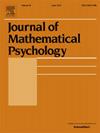Analysing the bias introduced by adaptive designs to estimates of psychometric functions
IF 1.5
4区 心理学
Q2 MATHEMATICS, INTERDISCIPLINARY APPLICATIONS
引用次数: 0
Abstract
An adaptive design adjusts dynamically as information is accrued. In psychometrics and psychophysics, a class of studies investigates a subject’s ability to perform tasks as a function of the stimulus intensity, ie the amount or clarity of information supplied for the task. The relationship between performance and intensity is represented by a psychometric function. Such experiments routinely apply adaptive designs using both previous intensities and performance to assign stimulus intensities, the strategy being to sample intensities where information about the psychometric function is maximised. We investigate the influence of adaptation on statistical inference about the psychometric function focusing on estimation, considering parametric and non-parametric estimation under both fixed and adaptive designs and under within-subject independence as well as dependence. We study the scenarios analytically and numerically through a simulation study. We show that while asymptotic properties of estimators are preserved under adaptation, the adaptive nature of the design introduces small-sample bias, in particular in the slope parameter of the psychometric function. We supply an explanation of this phenomenon that formalises and supplements the one found in the literature. We argue that this poses a dilemma for studies applying an adaptive design in the form of a trade-off between more efficient sampling and the need to increase the number of samples to ameliorate small-sample bias.
分析自适应设计对心理测量函数估计的偏差
自适应设计随着信息的积累而动态调整。在心理测量学和心理物理学中,一类研究调查了受试者执行任务的能力,将其作为刺激强度的函数,即为任务提供的信息的数量或清晰度。表现和强度之间的关系用心理测量函数表示。这类实验通常采用自适应设计,使用先前的强度和表现来分配刺激强度,策略是在有关心理测量功能的信息最大化的地方取样强度。本文以估计为中心,研究了自适应对心理测量函数统计推断的影响,考虑了固定设计和自适应设计下的参数估计和非参数估计,以及被试独立性和依赖性。我们通过模拟研究对这些场景进行了分析和数值研究。我们表明,虽然估计量的渐近性质在自适应下保持不变,但设计的自适应性质引入了小样本偏差,特别是在心理测量函数的斜率参数中。我们提供了一种对这种现象的解释,这种解释形式化并补充了文献中发现的解释。我们认为,这给应用自适应设计的研究带来了一个困境,即在更有效的抽样和需要增加样本数量以改善小样本偏差之间进行权衡。
本文章由计算机程序翻译,如有差异,请以英文原文为准。
求助全文
约1分钟内获得全文
求助全文
来源期刊

Journal of Mathematical Psychology
医学-数学跨学科应用
CiteScore
3.70
自引率
11.10%
发文量
37
审稿时长
20.2 weeks
期刊介绍:
The Journal of Mathematical Psychology includes articles, monographs and reviews, notes and commentaries, and book reviews in all areas of mathematical psychology. Empirical and theoretical contributions are equally welcome.
Areas of special interest include, but are not limited to, fundamental measurement and psychological process models, such as those based upon neural network or information processing concepts. A partial listing of substantive areas covered include sensation and perception, psychophysics, learning and memory, problem solving, judgment and decision-making, and motivation.
The Journal of Mathematical Psychology is affiliated with the Society for Mathematical Psychology.
Research Areas include:
• Models for sensation and perception, learning, memory and thinking
• Fundamental measurement and scaling
• Decision making
• Neural modeling and networks
• Psychophysics and signal detection
• Neuropsychological theories
• Psycholinguistics
• Motivational dynamics
• Animal behavior
• Psychometric theory
 求助内容:
求助内容: 应助结果提醒方式:
应助结果提醒方式:


